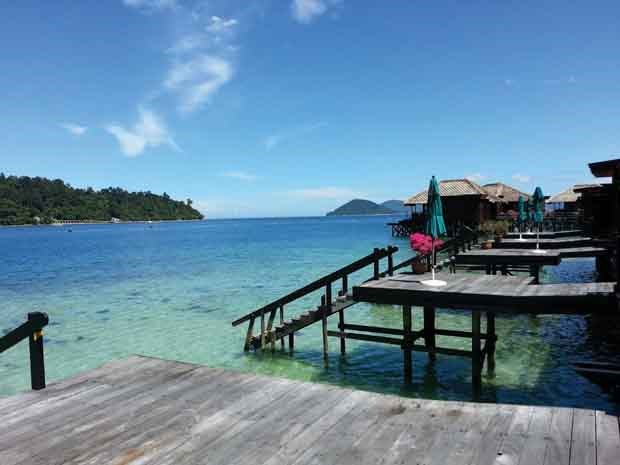Kota Kinabalu, Sabah, Malaysia: land of mystery.
On its surface Malaysia is a couple islands sandwiched between Indonesia, Singapore, Cambodia and Thailand. To the unread and un-Googled, like myself, I assumed it would be like those locations.
Nothing could be further from the truth. Malaysia, and specifically Kota Kinabalu in the Sabah region of northern Borneo, is the ultimate stir-fry of cultures. It's a couple of tropical islands, yet an Asian country with deep Muslim roots and an affinity for spicing up the sauce with all kinds of western and Indian layers mixed into their way of life.
It's the sort of place you could walk outside any time of year and not have to worry about wearing a sweater. Keep going and you'll be sure to find some of the freshest mangosteen in the world, then maybe visit a mosque, and finally trek into the jungles within the same day. It's like the tropics, India and Asia decided to have a baby, and it got some of the best traits from each of its parents.
Not only is there always something new and exciting to do, but it never gets stagnant or boring, even on some of the long journeys to the most exciting places to visit.
Kuala Lumpur is the primary tourist destination in Malaysia by far, but its long shadow tends to cast over one of the most wonderful places to visit in the entire country: Kota Kinabalu (or KK as they say).
Kota Kinabal - in northern Borneo, where the landmass is divided in part with Indonesia - is too awesome, in fact, to encapsulate within a couple paragraphs, so I'm going to break it down like so.
n The Malaysian fish massage Kinabalu National Park is named as such because it's a national treasure and a certified World Heritage site. Mountaineering folk can tackle Mt. Kinabalu, the largest in southeast Asia, or one of many trails interlaced throughout park.
But sometimes it's nice to just relax, and the Malaysians do this in one of the most odd and fascinating ways: a "fish massage" at the Kampung Luanti river "fish spa."
The fish in the river are protected from any kind of harvesting, local or otherwise. For an island country that's a rarity, but it's easy to see why given such a unique experience.
As soon as you step into the water hundreds of fish swarm your feet and begin to "gently eat your flesh." Yes, in this river, the fish eat you.
But not to worry as they only eat the dead skin on your body. Or at least that's what I was told before a suckling giant snatched onto my big toe. But I like to think he was just being thorough.
Through thick and thin the experience is unlike any other. Hundreds of fish swarm the feet and legs, or really whatever you decide to put into the water. Children would giggle and run out of the water as fish swam towards them for a meal, only to be jumping in the next minute shrieking with delight.
It's a must do.
Nighttime cruises and the proboscis monkeys Kota Kinabalu and the rest of Borneo is home to one of the rarest delights nature has yet produced: the proboscis monkey.
This intelligent, family-oriented creature is easily identified by its long nose.
River cruises 45 minutes outside of KK are a popular destination for tourists to experience firsthand these living oddities, as every evening as the sun sets, they travel to the river and sleep, huddled together, in the trees.
The silhouettes of the monkeys is both aweinspiring and unnerving. With the falling sun behind them, their dark outlines make them look like human beings sitting in the trees, tending to their young.
Once dusk settles in, the next act takes the stage: the fireflies.
These beautiful insects live by the thousands in a single tree. In the night, it's akin to nature's Christmas tree.
Witnessing two beautiful pieces of nature in one go is not a wasted trip.
Shangri-La's Rasa Ria Resort Roughly 45 minutes from Kota Kinabalu is the world-class Rasa Ria Resort.
If you're looking for a slice of paradise, this is the place to go. Stunning beaches, hundreds of amenities, activities, and yes, places to drink.
Yet even to the most hardcore travellers, who don't want the comfort of a resort, can still find something to do - the Orangutan Conservatory.
Open to the public, this natural reserve takes in orphaned orangutans from around the country and rehabilitates them back into the wild. It's a process that takes years, even stacking different programs for different aged orangutans, making this place a veritable elementary and high school system for apes.
Once an hour park rangers will talk to interested visitors and then trek them through a jungle path to the feeding ground.
The open, wild environment is perfect for the orangutans to come and go freely. Their only incentive to stay is the food and company, and the rangers use the setting to teach them how to survive on their own.
Apart from being in the jungle yourself, this is as close as one can get to orangutans.
Access to Kota Kinabalu is getting easier as multiple airlines are opening direct flights, including most recently Malaysia Airlines.
KK is a fantastic place to visit any time of year, just keep in mind between November and February the odds of rain go up but other than that it's good to go.



